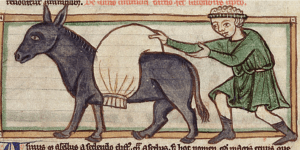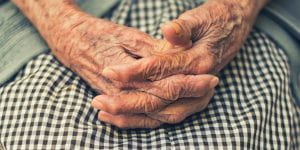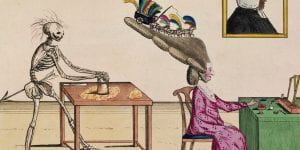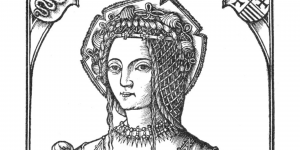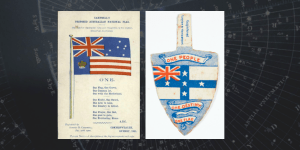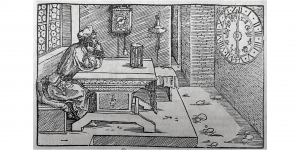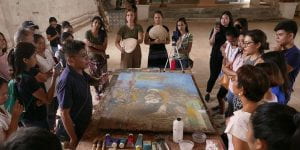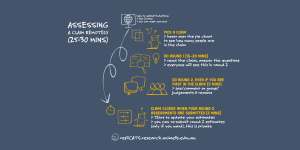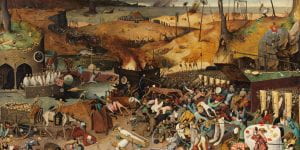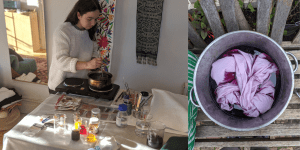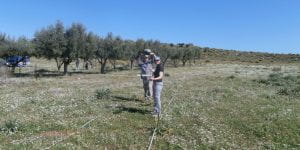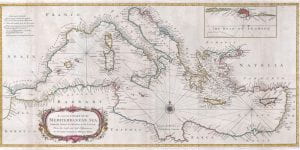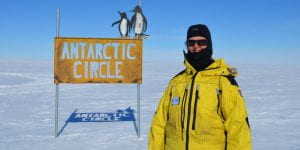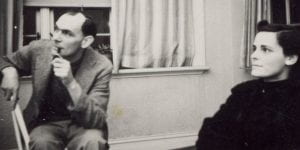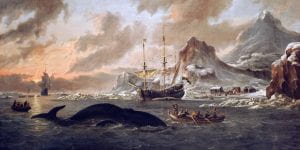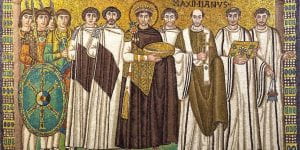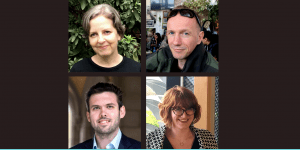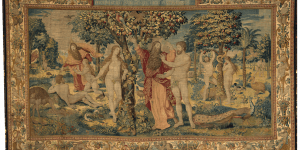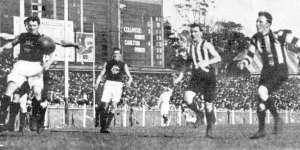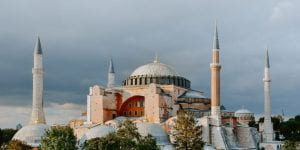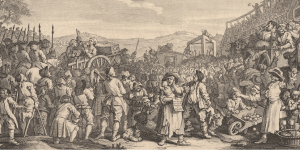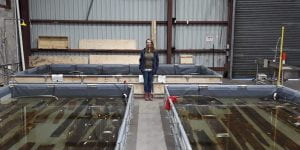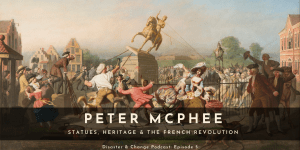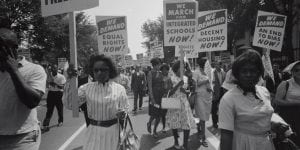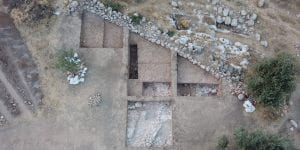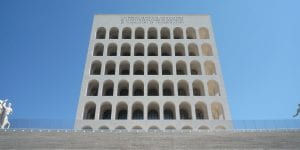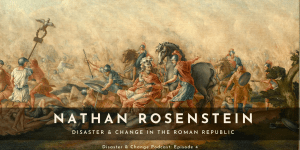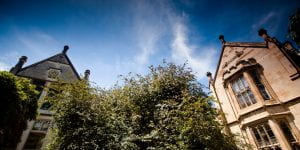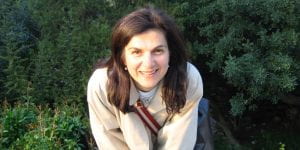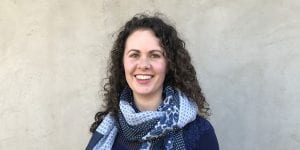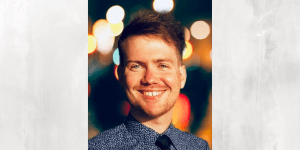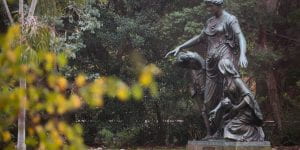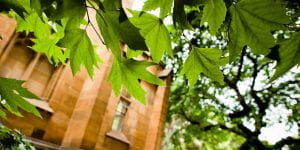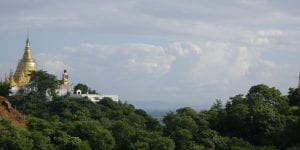dnicole
-
‘Donkey Work’ and the History of Labour
Kathryn Smithies, Associate in History, recently published the book Introducing the Medieval Ass, on the cultural and socio-economic history of the donkey (previously known as the ass) in the Middle Ages and beyond. She also blogs about all things donkey at bloggingdonkeys.com. In this piece, she explores the history of the phrase “working like a donkey”, […] -
The Uncounted Death Toll of Coronavirus in Aged Care
Associate in History Marama Whyte reflects on the acute crisis in the aged care sector that has been revealed so tragically by the pandemic.blogs.unimelb.edu.au/shaps-research/2020/11/04/the-uncounted-death-toll-of-coronavirus-in-aged-care
-
Feminism and the History of Democracy
The English historian Catharine Macaulay (1731–1791) was one of the leading radical thinkers of her time and, yet, she has been largely forgotten today. In this blog post, Karen Green, Honorary Professorial Fellow in Philosophy, and author of a number of works about Catharine Macaulay, makes the case for reintegrating her legacy into the history […]blogs.unimelb.edu.au/shaps-research/2020/11/02/feminism-and-the-history-of-democracy
-
Darius von Güttner on Bona Sforza, Queen of Poland
Bona (1494–1557) was the Sforza heir to the throne of Milan and became the Queen of Poland. She was a key figure in the politics and economic life of early modern Europe, an economic innovator and reformer, art and architectural patron. Significant extant source base about Bona’s activities allows for investigation into, and interpretation of, […]blogs.unimelb.edu.au/shaps-research/2020/10/20/born-to-rule-bona-sforza-queen-of-poland
-
On God and Science
For 20 years, Reverend Dr Stephen Ames has co-taught one of the most popular courses in the History and Philosophy Science program, God and the Natural Sciences (HPSC2002). In this subject, Stephen, who is both an Anglican Priest and HPS scholar, worked alongside atheist colleagues to show how religious and non-religious points of view can […]blogs.unimelb.edu.au/shaps-research/2020/10/19/on-god-and-science
-
Federation Stars: The Meanings of Popular Astronomy in Australia at the Turn of the Twentieth Century
In 1901 a new flag was chosen to represent a new nation, and the central emblem was a constellation of the southern sky. By this time, the symbolism of the Southern Cross had been entrenched; almost all previous Australian flag designs had included this device. The meanings of the Cross and the southern stars were, […] -
The Sands of Time: Histories of the Medieval and Early Modern Hourglass
Sandglasses were part of the variegated ecology of time measurement in the premodern world. This was a world attentive to time, where knowledge of the temporal rhythms of the environment reached from the movements of the stars to the fall of granules of lead. Among human-made instruments for time measurement, the sandglass was one of […] -
Restoring and Conserving the Parish Church at Guiuan, Eastern Samar
In the wake of Super Typhoon Yolanda in the Philippines, National Museum of the Philippines conservators, heritage professionals, architects and anthropologists, have been working with parishioners and local craftspeople and artists to restore and conserve the historic church of La Inmaculada Concepción at Guiuan, in the province of Eastern Samar. The Grimwade Centre for Cultural […]blogs.unimelb.edu.au/shaps-research/2020/09/30/restoring-and-conserving-the-parish-church-at-guiuan
-
Reimagining Trust in Science
During National Science Week 2020 the History and Philosophy of Science program (HPS) hosted two events as part of the University of Melbourne’s Science Festival. The first event was a panel discussion on ‘Reimagining Trust in Science’, the second an interactive workshop showing how the repliCATS platform is being used to assess the reliability of […]blogs.unimelb.edu.au/shaps-research/2020/09/22/reimagining-trust-in-science
-
Other Awful Years in History
Around the world, people can’t wait for 2020 to end. COVID-19 has killed close to a million people globally over the course of the pandemic. On top of the coronavirus, there’s been significant floods in Uganda, Kenya, Pakistan and the UK, Australia has experienced devastating bush fires, storms have battered the Americas, and locusts have […]blogs.unimelb.edu.au/shaps-research/2020/09/21/other-awful-years-in-history
-
WFH as a Textile Conservator
Victoria Thomas is a textile conservator at Grimwade Conservation Services, the commercial arm of the Grimwade Centre. In this recent article, republished here from Gabberish, she explores what it’s like to be a conservator working from home during Melbourne’s COVID-19 lockdown. She looks at how one can still carry out some of the complexities of […]blogs.unimelb.edu.au/shaps-research/2020/09/15/wfh-as-a-textile-conservator
-
Welcome Dr Lieve Donnellan!
This semester we welcome Dr Lieve Donnellan, incoming Lecturer in Classical Archaeology. Lieve comes to the university from her previous role as Assistant Professor of Classical Archaeology at the University of Aarhus in Denmark. After graduating in archaeology from Ghent University in 2012, Lieve held various fellowships and positions at the Universities of Chicago, Göttingen […]blogs.unimelb.edu.au/shaps-research/2020/09/08/welcome-dr-lieve-donnellan
-
Pirates or Partners?
Famed as the home of the dreaded Barbary pirates, the ‘scourge of Christendom’, for many early modern Europeans and Britons, the Maghreb was a distant and terrifying place. Some, however, saw the corsairing states as legitimate military rivals, potential trading partners or allies, and even attractive places for migration and personal advancement. Recently, History PhD […]blogs.unimelb.edu.au/shaps-research/2020/09/08/pirates-or-partners
-
Exploring the History of Whales and Whaling
A number of our graduates go on to pursue careers in the GLAM sector – that is, Galleries, Libraries, Archives & Museums. Charlotte Colding Smith completed a PhD in History in 2010, and has gone on to work at a number of institutions and museums internationally. She is a Senior Expert Fellow at the German […]blogs.unimelb.edu.au/shaps-research/2020/09/04/exploring-the-history-of-whales-and-whaling
-
Body-makers and Farthingale-makers in Seventeenth-century London
By 1700 tailors no longer dominated England’s garment marketplace, as stay-makers, mantua-makers and seamstresses began to produce key items of female dress previously made by tailors. The demise of the tailoring monopoly was a complex process that involved many factors. On 3 September, our McKenzie Fellow, Sarah Bendall, presented the weekly Brown Bag talk, which […] -
From HPS to Saving Planet A
Recently, HPS Alumna Dr Zoë Loh featured on the ABC documentary Fight for Planet A in relation to her role as a senior research scientist at CSIRO. In this interview, Zoë spoke with Samara Greenwood about her love for History and Philosophy of Science and how it has contributed not only to her career, but […]blogs.unimelb.edu.au/shaps-research/2020/09/01/from-hps-to-saving-planet-a
-
Documenting Margel Hinder’s Contribution to Australian Modern Art
Earlier this year, Grimwade Centre Masters of Cultural Material Conservation students had the chance to work with Denise Mimmocchi, Senior Curator at the Art Gallery of New South Wales, in connection with a retrospective on the works of pioneering Australian-American artist Margel Hinder (1905–1985). The upcoming exhibition Margel Hinder: Modern in Motion at the Art […] -
The Bishop with 150 Wives
Francis Xavier Gsell is famous for his work among the Tiwi people, from whom he purchased the marriage rights to young women as part of a broad evangelisation strategy. A mythic figure in popular histories of the Northern Territory, Gsell is often remembered as the apocryphal ‘Bishop with 150 Wives’. But Gsell’s complex legacy has […]blogs.unimelb.edu.au/shaps-research/2020/08/17/the-bishop-with-150-wives
-
“Ffor Whalebones to it”: The Baleen Trade and Fashion in Sixteenth-century Europe
During the sixteenth century the bodies of Europe’s elites began to change in size and form as men and women adopted wide starched ruffs and collars, ballooning sleeves, stiffened or bombast upper garments and puffy lower garments. Such a structured silhouette set the tone for centuries of fashion and was the result of changing artistic […]blogs.unimelb.edu.au/shaps-research/2020/08/17/ffor-whalebones-to-it
-
Volcanic Winter and Pandemic Pandemonium
A terrible onslaught of bubonic plague in the sixth century abruptly ended Emperor Justinian’s dream of reunifying the Roman empire and caused massive geopolitical upheaval. Associate Professor Frederik Vervaet from Classics & Archaeology tells us more about this ancient pandemic and its consequences in this article republished from Pursuit. In 527 CE, when Emperor Justinian […]blogs.unimelb.edu.au/shaps-research/2020/08/16/volcanic-winter-and-pandemic-pandemonium
-
Chris Bendle
Chris Bendle, ‘The Office of Magister Militum in the 4th Century CE: A Study into the Political and Military History of the Later Roman Empire’ (MA in Classics & Archaeology, 2020) The magistri militum were the highest-ranking generals of the late Roman imperial army. Emperor Constantine I created this office in the early part of […] -
The Inaugural SHAPS Optimus Awards
In 2019 SHAPS Head of School Professor Margaret Cameron launched a new set of annual awards. Through the Optimus Awards, SHAPS will recognise and celebrate members of our community who exemplify one or more of the values articulated in the Faculty of Arts Strategy Map 2019–2025. All members of the School community, including undergraduate and […]blogs.unimelb.edu.au/shaps-research/2020/08/14/the-inaugural-shaps-optimus-awards
-
Meet the 2020 Hansen PhD Scholar Cat Gay
The Hansen Trust, established to advance the study of History at University of Melbourne, includes an annual PhD scholarship to the doctoral program in History in SHAPS. The 2020 recipient, Cat Gay, is working to uncover the life stories and experiences of girls in nineteenth-century Victoria through the study of the material culture that they […]blogs.unimelb.edu.au/shaps-research/2020/08/12/cat-gay-hansen-phd-scholarship-holder-2020
-
Are There ‘Male’ and ‘Female’ Brains?
How useful are the well-known and hotly contested categories of ‘male brain’ and ‘female brain’? Among experts, nobody really questions that anatomical sex differences in the brain exist. But since the advent of brain science, the scientific community has been divided over how many differences there are, which ones have been definitively proven, how large […]blogs.unimelb.edu.au/shaps-research/2020/08/10/are-there-male-and-female-brains
-
Is This the Earliest Depiction of a Dodo in Art?
The Jagiellonian arrases – tapestries that decorate the walls of Wawel Castle in Poland – may be one of the earliest known artistic representation of the long-extinct dodo. SHAPS Principal Research Fellow Dr Darius von Güttner tells us more in this fascinating article republished from Pursuit. This month marks 500 years since the birth of […]blogs.unimelb.edu.au/shaps-research/2020/08/07/is-this-the-earliest-depiction-of-a-dodo-in-art
-
Sport, Community and Everyday Life: World War One and COVID-19 Compared
For many Australians, the economic pain brought by the COVID-19 crisis has been compounded by the disruption caused to sporting activities. For football-loving Melburnians, the very rhythm of the week was rendered unrecognisable after the temporary suspension of the 2020 AFL season in March. The closing down of sports at the local community level has […]blogs.unimelb.edu.au/shaps-research/2020/07/31/sport-community-everyday-life
-
How to Keep Minorities Out of Philosophy
Academic philosophy faces numerous challenges in the current climate. One of its ongoing problems is the systemic barriers in place in the discipline for minority students. In this article, republished from Overland, SHAPS PhD Candidate Paul-Mikhail Catapang Podosky and recent Honours graduate Kelly Herbison explore some of these issues. As we gathered on our university’s […]blogs.unimelb.edu.au/shaps-research/2020/07/24/how-to-keep-minorities-out-of-philosophy
-
Hagia Sophia Reigns Serene
Istanbul’s 1,500 year-old Hagia Sophia has a tumultuous history and its return to being a mosque is only the latest twist for a building that has long rolled with the times. SHAPS Principal Fellow (Honorary) Associate Professor Roger Scott, gives us a snapshot of its history in this article, republished from Pursuit. If you were […]blogs.unimelb.edu.au/shaps-research/2020/07/23/hagia-sophia-reigns-serene
-
What Today’s News Has in Common with Early Execution Ballads
Violence, corruption and murder dominate our modern headlines, but little has changed since execution ballads were sung in sixteenth-century Europe. In this article, republished from Pursuit, Lisa Needham talks to Dr Una McIlvenna from SHAPS about the similarities between headlines of today and the early modern period. Since the start of 2020, it’s felt like […] -
Confronting the History of Race and Empathy in the Classroom: A Conversation with Dr Sarah Walsh
In June 2020, Dr Sarah Walsh joined the History Program as our new Hansen Lecturer in Global History. In this new podcast, in conversation with History PhD candidate Amy Hodgson, Dr Walsh discusses her research, and her approach to teaching. The interview traverses a wide range of topics, including the challenges posed by online teaching, especially when it comes to handling difficult and confronting histories of oppression and violence. What approaches can be used to foster empathy and kindness in the classroom? What methods can researchers working on these topics use in order to take care of their own mental health and wellbeing? And what are some useful starting points for people who want to educate themselves about issues around race and racism? -
Remembering Ding Dyason: Bringing Humanities and Science Together
Last year marked one hundred years since the birth of Diana ‘Ding’ Dyason (1919–1989), historian of medicine and former head of History and Philosophy of Science (HPS). As one of HPS’s most inspiring and effective leaders, Ding Dyason was honoured with a series of events including the Ding Dyason Centenary HPS Seminar at the University […] -
Australia’s Earliest European-built Boat?
The Barangaroo Boat, as it has come to be known, was discovered in November 2018 during development works conducted by Sydney Metro. After completing her MA in Cultural Materials Conservation in 2019, Heather Berry took up a job as a maritime conservator, working with Silentworld Foundation to conserve and preserve the Barangaroo Boat. In this […]blogs.unimelb.edu.au/shaps-research/2020/07/10/australias-earliest-european-built-boat
-
Episode 5 in the SHAPS Podcast Series: Professor Peter McPhee
Societies have always used statues and other monuments as ways of recognising power and eminence. In Australia, as in many other places, there is currently public debate over whether some statues should be removed, who should make the decision, and what should be the fate of the statues themselves. Should they be displayed with explanatory plaques, taken away to be preserved in museums or simply removed? Such debates are common in history. In this episode, Professor Peter McPhee surveys the wide range of objects destroyed during the French Revolution – from buildings and statues to books and paintings – but also the remarkable responses of revolutionary governments. It concludes with some reflections about the place of monumental statues and heritage sites in Australia.blogs.unimelb.edu.au/shaps-research/2020/07/06/disaster-change-5
-
Race, Change and Time in the USA
Americans are reaching back into history to try to understand why progress on racial equality has been so heartbreakingly slow. In this article, republished from Pursuit, Professor David Goodman explores the question. Many commentators have compared or rejected comparison between the current public protests sparked by the death of George Floyd in the USA and the uprisings […]blogs.unimelb.edu.au/shaps-research/2020/07/03/race-change-and-time-in-the-usa
-
Science Needs to Look Inward to Move Forward
Robust science depends on encouraging and incentivising more open and transparent practices in research – now, metascientists are looking at what works and what doesn’t.In a piece originally published in Pursuit, Andrew Trounson reports on this new discipline, including the contributions of Professor Fiona Fidler and Professor Simine Vazire from University of Melbourne. About a year […]blogs.unimelb.edu.au/shaps-research/2020/06/30/science-needs-to-look-inward-to-move-forward
-
National Archaeology Week 2020 Goes Online
Each year in the third week of May, Australia celebrates National Archaeology Week. This year, our postgraduate community took a leading role in taking National Archaeology Week online, coming up with creative ways of promoting archaeology in a time of pandemic-related disruption. Larissa Tittl gives us a run-down on the week’s events and activities. National […]blogs.unimelb.edu.au/shaps-research/2020/06/29/national-archaeology-week-2020-goes-online
-
A New Look at the History of Fascism
For decades, third-year undergraduate History students at Melbourne have taken the subject Hitler’s Germany (HIST 30010). From Semester Two 2020, the subject will be expanded to cover the history of European fascism more broadly, reflecting the expertise of the subject coordinator, Dr Ángel Alcalde, who joined the History program in 2019 as Lecturer in Twentieth-century European History. […]blogs.unimelb.edu.au/shaps-research/2020/06/22/a-new-look-at-the-history-of-fascism
-
Episode 4 in the SHAPS Podcast Series: Professor Nathan Rosenstein
The catastrophic defeat Hannibal inflicted on Rome at Cannae in 216 BCE forced the Republic to drastically change how it would fight the Second Punic War. A strategy of direct military confrontation had to be abandoned in favour of a war of attrition. This strategic shift necessitated a series of additional changes in how Rome […]blogs.unimelb.edu.au/shaps-research/2020/06/15/disaster-change-4
-
SHAPS in the Media (May 2020)
This month’s digest of SHAPS research in the media offers a rich selection across a range of topics and genres, from podcasts on Bronze Age pandemics, and on the relationship between logic and belief; online conversations about the ethics of conducting sustainable research, and about cinematic representations of Stalinism; radio interviews on new books in […]blogs.unimelb.edu.au/shaps-research/2020/06/12/shaps-in-the-media-may-2020
-
Stephen Campbell-Wright
Stephen Campbell-Wright, ‘Point Cook: The Crucible of Air Force Capability in Australia’ (PhD in History, 2020) This thesis argues that place can have an influence on cultural heritage. A site can have a profound effect on the cultural heritage of a community or institution through the influence it exerts on public memory and sense of […]blogs.unimelb.edu.au/shaps-research/2020/06/08/stephen-campbell-wright
-
Rhys Cooper
Rhys Cooper, ‘The Transformation of Australian Military Heroism during the First World War’ (PhD in History, 2020). This thesis examines how Australian heroism was defined and represented during the First World War. I present an in-depth analysis of two sets of primary sources: Victoria Cross (VC) medal citations and Australian wartime newspapers. Victoria Cross citations […] -
Kate Davison
Kate Davison, ‘Sex, Psychiatry and the Cold War: A Transnational History of Homosexual Aversion Therapy, 1948–1981′ (PhD in History, 2020) Aversion therapy was a method of ‘treatment’ for sexual ‘deviation’ adopted by some psychiatrists and psychologists in the decades following the Second World War. There were several variations of the procedure, but most involved subjecting […] -
Spiridoula Demetriou
Spiridoula Demetriou, ‘Imagining Modern Greece: Mesologgi, Philhellenism and Art in the 19th century’ (PhD in History, 2020) Renowned as the site of Byron’s death, and the centre of war operations in western mainland Greece during the Greek War of Independence [1821–1832], Mesologgi duly became a focus of Philhellene propaganda in the revolt against Ottoman rule. […]blogs.unimelb.edu.au/shaps-research/2020/06/07/spiridoula-demetriou
-
Gretel Evans
Gretel Evans, ‘Through Fire and Flood: Migrant Memories of Displacement and Belonging in Australia’ (PhD in History, 2020) Natural disasters are a significant feature of the Australian environment. In a country with a rich history of immigration, it is therefore surprising that historians have not yet examined the specific challenges faced by immigrants within this […] -
Michael Francis
Michael Francis, ‘”The Bishop with 150 Wives“: Interrogating the Missionary and Ecclesiastical Career of Monsignor Francis Xavier Gsell MSC (1872–1960)’ (PhD in History, 2020). This thesis provides the first comprehensive scholarly investigation into the missionary and ecclesiastical career of Monsignor Francis Xavier Gsell MSC (1872-1960). Remembered as the apocryphal ‘Bishop with 150 Wives’, Gsell is […]blogs.unimelb.edu.au/shaps-research/2020/06/06/michael-francis
-
Ashleigh Green
Ashleigh Green, ‘Birds in Roman Life & Myth‘ (PhD in Classics & Archaeology, 2020) In Ancient Rome, the role of birds in everyday life and myth was one of critical importance. This thesis examines birds in their assigned roles of divine messengers, heralds, hunting quarry, domestic flocks, and companion animals, focusing primarily on the transitional […]blogs.unimelb.edu.au/shaps-research/2020/06/05/ashleigh-green
-
Daniel Hannington-Pinto
Daniel Hannington-Pinto, ‘The Social and Moral Campaigning of Australian Trade Unions, 1960s to 2015’ (PhD in History, 2020) Although wages and working conditions have long been their ‘bread and butter’, trade unions have frequently campaigned on broader social and moral issues. In the Australian context, however, the labour history literature remains relatively silent on these […]blogs.unimelb.edu.au/shaps-research/2020/06/04/daniel-hannington-pinto
-
Phoebe Kelloway
Phoebe Kelloway, ‘Three Major Industrial Disputes 1928–30, Rank-and-File Action and the Communist Party of Australia’ (Phd in History, 2020) At the start of the Depression in Australia, workers in three industries waged determined struggles against significant cuts to their wages and conditions: waterside workers in 1928, timber workers in 1929, and coalminers of the NSW […]blogs.unimelb.edu.au/shaps-research/2020/06/04/phoebe-kelloway-2
-
Martin Kovacic
Martin Kovacic, ‘The Buddhist Ethics of Killing: Metaphysics, Phenomenology, Ethics’ (PhD in Philosophy, 2020) Significant media interest and academic scholarship has in recent years brought attention to the normative status of killing in Buddhism, concurrent with the worst genocidal event since the last century, committed by apparent Buddhists, in Rakhine State in Myanmar, in August-September […]blogs.unimelb.edu.au/shaps-research/2020/06/03/martin-kovacic
-
Katherine Mannell
Katherine Mannell, ‘Young Adults, Mobile Messaging, and the Negotiation of (Un)Availability’ (PhD, History & Philosophy of Science, 2020) With a mobile phone, a person can reach and be reached anytime, anywhere. As many scholars have noted, this creates mutual expectations of availability, particularly among young adults whose friendships typically involve high rates of mobile messaging. […]blogs.unimelb.edu.au/shaps-research/2020/06/03/katherine-mannell
Number of posts found: 447
